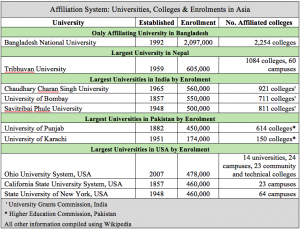In the same way that debates are presently taking place regarding the organization and administration of systems of higher education, discussion as to the organization of states themselves and their relationship with each other is likewise occurring. In those nations where governmental power is derived through the ballot box, much attention has been paid to whether there is a correlation between a person’s education level and their support for policies that promote cultural openness and liberalism. Analysis of voter preferences in several recent polls seem to indicate that individuals who have completed higher education tend to be more positively disposed toward policies which promote openness and inclusion than those who have not. At the same time, recent elections have given rise to leaders that threaten the liberal order, as in the Philippines, and elsewhere, once-democratic leaders have tended towards illiberalism in countries like Hungary, Turkey, and the Ukraine.
Recently, these two debates came to a head in Hungary, where illiberal Prime Minister Viktor Orban used a parliamentary majority to pass a law targeting academic freedoms. One university, in particular, has been the target of Orban’s ire for several years. Central European University in Budapest, was founded in 1991 by George Soros’ Open Society Foundations to reintroduce liberal thought in post-Soviet Eastern Europe. Orban, meanwhile, most often makes headlines for his government’s staunch opposition to EU migration policy and for closing Hungary’s borders to refugees. Technically, the university is accredited to award graduate and doctoral degrees in both the U.S. and Hungary, however, the sole physical campus is in Budapest. Orban’s new law forbids this practice: now foreign universities must have a campus in their country of origin to operate a satellite campus in Hungary.
Orban’s persecution of CEU has inspired outrage throughout the academic community. Michael Ignatieff, former professor at Harvard and Oxford, leader of the Canadian Liberal party, and current President of CEU, has been an outspoken critic of Orban at the global level. Outside of CEU staff, Cas Mudde, noted scholar on European populism, used an editorial in The Guardian to call upon the EU to intervene on behalf of liberal freedoms. After 70,000 people protested the move in Budapest last month, the EU presented Orban with an official notice this week, calling on his government to explain the ‘breach of EU law.’ This is considered the first step in bringing a legal penalty against Orban, however, it is largely contingent upon Hungary’s cooperation in the process. As a result, CEU’s fate remains unclear.
Orban’s effort, while posing a threat to democracy and intellectual freedom, could well be undermined by today’s unprecedented individual mobility and global technological integration. Orban can shut down an American university, but he cannot stop the flow of ideas from America and other countries to Hungary. Just take China as an example. While the Chinese government banned Facebook, Twitter and popular Western social media sites, people in China found ways to access these sites and spread their know-hows on the Internet. Meanwhile Turkey, where some 5,000 academics have been fired or arrested in response to the failed July coup, is an ongoing case study in whether the global knowledge sharing economy can actively overcome illiberal domestic policies.
In today’s technological landscape of high-speed internet and free social media sites, ideas can spread cheaply and almost instantaneously. Governments can shut down the physical form of a university, but the function of the university – a democratic hub for idea exchange and intellectual development – has been shared by the Internet, even before the rise of MOOCs. The most effective way to stop the exchange of global ideas, perhaps, is by completely shutting down the Internet, which is not something that China, Turkey, or Hungary would seriously attempt.
